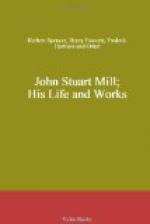The biggest lion in the path was the doctrine of so-called “necessary truth.” This doctrine was especially obnoxious to him, as it set up a purely subjective standard of truth, and a standard—as he was easily able to show—varying according to the psychological history of the individual. Such thinkers as Dr. Whewell and Mr. Herbert Spencer had to be met in intellectual combat. Dr. Whewell held, not that the inconceivability of the contradictory of a proposition is a proof of its truth co-equal with experience, but that its value transcends experience. Experience may tell us what is; but it is by the impossibility of conceiving it otherwise that we know it must be. Mr. Herbert Spencer, too, holds that propositions whose negation is inconceivable have “a higher warrant than any other whatever.” It is through this door that ontological belief was supposed to enter. “Things in themselves” were to be believed in because we could not help it. Modern Noumenalists agree that we can know nothing more of “things in themselves” than their existence, but this they continue to assert with a vehemence only equalled by its want of meaning.
In his “Examination of Sir William Hamilton’s Philosophy,” Mr. Mill gives battle to this mode of thought. After reviewing, in an opening chapter, the various views which have been held respecting the relativity of human knowledge, and stating his own doctrine, he proceeds to judge by this standard the philosophy of the absolute and Sir William Hamilton’s relation to it. The argument is really on the question whether we have or have not an intuition of God, though, as Mr. Mill says, “the name of God is veiled under two extremely abstract phrases,—’The Infinite’ and ‘The Absolute.’” So profound and friendly a thinker as the late Mr. Grote held this raising of the veil inexpedient, but he proved, by a mistake he fell into, the necessity of looking at the matter in the concrete. He acknowledged the force of Mr. Mill’s argument, that “The Infinite” must include “a farrago of contradictions;” but so also, he said, does the Finite. Now undoubtedly finite things, taken distributively, have contradictory attributes, but not as a class. Still less is there any one individual thing, “The Finite,” in which these contradictory attributes inhere. But it was against a corresponding being, “The Infinite,” that Mr. Mill was arguing. It is this that he calls a “fasciculus of contradictions,” and regarded as the reductio ad absurdissimum of the transcendental philosophy.
Mr. Mill’s religious tendencies may very well be gathered from a passage in his review of Auguste Comte, a philosopher with whom he agreed on all points save those which are specially M. Comte’s. “Candid persons of all creeds may be willing to admit, that if a person has an ideal object, his attachment and sense of duty towards which are able to control and discipline all his other sentiments and propensities, and prescribe to him a rule of life,




